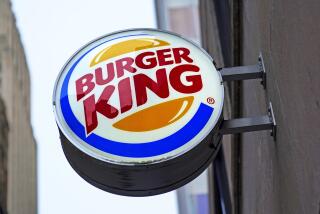High Court to Reconsider Cigarette Suits : Law: Key issue is, does the law mandating warning labels shield companies from damages?
- Share via
WASHINGTON — American makers of asbestos were driven into bankruptcy by ruinous lawsuits holding them responsible for the cancer deaths of thousands of shipyard workers.
So too with the A.H. Robins Co., the maker of the Dalkon Shield, a birth control device that proved dangerous for women. Their damage claims eventually destroyed the company.
But the giant tobacco companies, makers of the most deadly of everyday products, according to medical studies, have escaped liability so far.
But that winning record will receive its biggest test beginning Monday in the Supreme Court. The key issue: Does the 1965 federal law requiring warning labels on cigarette packs shield the companies from claims that they deliberately misled smokers into taking up or continuing the smoking habit?
Every federal appeals court that has considered the issue has answered yes. Those rulings have stymied lawyers who want to hold the tobacco firms responsible for the deaths of their clients.
However, the Supreme Court last year agreed to reconsider those rulings. In October, the eight justices appeared evenly divided on the question, and they agreed to hear a new round of arguments. Now, the result likely depends on new Justice Clarence Thomas.
If the justices reverse the lower courts and say juries may hand down damage verdicts for misleading advertisements, anti-tobacco activists say the giant cigarette firms could face a huge liability.
“If we can present juries with the tobacco industry’s massive disinformation campaign, that’s when we start winning and winning big,” said Richard A. Daynard, a Boston attorney and head of the Tobacco Products Liability Project.
But lawyers for the tobacco firms say they are not especially worried. “We have the ‘common sense defense’ on our side,” said Charles Wall, associate general counsel for Phillip Morris.
The current case has its beginnings as far back as 1942, when a New Jersey teen-ager named Rose Cipollone began smoking because she wanted to be “glamorous” like the models in cigarette ads. In those years, radio stars such as Arthur Godfrey were telling listeners that smoking was not only safe but may enhance good health.
But by the 1960s, the Surgeon General had told Americans that smoking could cause lung cancer. After 1965, cigarette packs warned that smoking “may be hazardous to your health.” After 1970, the labels said smoking “is dangerous to your health.” Still, spokesmen for the tobacco industry downplayed the danger.
The tobacco firms also promoted cigarettes with new filters or “low tar,” suggesting these may indeed be safer. Rose Cipollone said she was deceived into continuing her deadly habit. In 1984, at age 58, she died of lung cancer.
The U.S. Surgeon General’s Office estimates that 434,000 Americans die each year because of smoking or smoking-related illnesses, more than the number of deaths from alcohol, auto accidents, fire, AIDS, illegal drugs, suicides and homicides combined.
Cipollone’s lawsuit against the cigarette makers, carried on first by her husband and now by her son, became the most closely watched test of the tobacco industry’s legal invulnerability. In 1988, a jury in Newark, N.J., ruled that she was mostly responsible for her own death. But it also held the tobacco firms 20% responsible and gave her heirs a $400,000 judgment, the first substantial defeat for the tobacco industry.
But a federal appeals court in Philadelphia threw out the verdict, ruling that Congress in 1965 intended to preempt all claims under state law for false or misleading advertisements. According to the appeals court, the 1965 warning law gave the tobacco industry a broad shield from liability.
In the first round of arguments in Cipollone vs. the Liggett Group, 90-1038, several justices said they doubted that Congress meant to shield the cigarette makers if they carried on a campaign of “deliberate deception” so as to override the message of the warning labels.
If the Supreme Court rules in favor of the tobacco companies, it will all but end large-scale litigation against the industry, most lawyers say. It is expensive to bring a lawsuit against a giant corporation, and plaintiffs’ lawyers probably will not try again if the chances for success are minimal.
But a high court victory for the Cipollones does not spell doom for the tobacco industry. Legal experts say trial lawyers would file more suits contending that the industry undertook a concerted campaign in the 1960s and ‘70s to deceive smokers into continuing their habit, but success before a jury is by no means assured.
“Everyone knows someone who has quit smoking. So juries will ask, ‘Why didn’t he (plaintiff) quit’?” says Alan B. Morrison, head of the Public Citizen Litigation Group.
More to Read
Inside the business of entertainment
The Wide Shot brings you news, analysis and insights on everything from streaming wars to production — and what it all means for the future.
You may occasionally receive promotional content from the Los Angeles Times.











